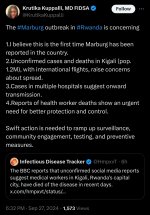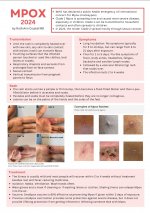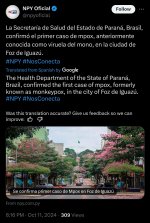Tristan
TB Fanatic
Army researchers contribute to the development of promising mpox vaccine
By Quentin JohnsonSeptember 20, 2024
FORT DETRICK, Md. — Research conducted by U.S. Army Medical Research Institute of Infectious Diseases scientists into a promising mpox vaccine has been featured in the prestigious scientific journal Cell, highlighting the institute’s commitment to protecting Warfighters against emerging deadly diseases.
USAMRIID’s team contributed to the design of the study, conducted the animal model studies and performed the immunoassay work, according to Dr. Jay W. Hooper, USAMRIID’s chief of molecular virology and a senior author of the article, “Comparison of protection against mpox following mRNA or modified vaccinia Ankara vaccination in nonhuman primates” published in the Sept. 4, 2024, issue of Cell.
The publication of the study findings is timely, as mpox continues to spread globally. More than 100,000 confirmed cases of mpox, including hundreds of deaths, have been reported across more than 120 countries from 2022 through mid-2024, according to the World Health Organization.
The study shows that while the mpox vaccine currently in use is effective, it has issues with cross-protection against similar viruses, incomplete immunity from mpox and adverse reactions. The new vaccine candidate, mRNA-1769, developed by Moderna, promises to address these shortcomings by using messenger RNA, or mRNA, to provide a more effective targeted approach to treating the disease.
“With the mRNA technology, we're able to produce a vaccine that gives quite potent responses with a very tolerable safety profile,” said Hooper, during an August 2024 interview with Cell Press.
The study found that mRNA-1769 lessened the symptoms and duration of the disease in animal models. This effectiveness means mpox patients could potentially see fewer symptoms such as less weight loss and lesions, according to the study.
The results also showed less viral shedding — spreading of the copied virus — in the blood and respiratory tract, which was a highlight of the study for Hooper.
“The most interesting finding was we confirmed what we had seen earlier with a DNA vaccine targeting mpox, and its protection against shedding of the virus from the throat swabs, which we have not seen with the MVA-based vaccines,” said Hooper.
Mpox is part of a larger group of viruses called orthopoxviruses, which includes smallpox and cowpox. The study found that mRNA-1769 has the potential to protect against those as well, a feature called cross-immunity, said co-first author Alec Freyn, a virology researcher at Moderna, during an August 2024 interview with Cell Press.
Cross-immunity is a key factor as it aligns with USAMRIID’s mission to defend against current and emerging biological threat agents for the protection of our Service Members, families and the nation.
“Improved orthopoxvirus vaccines are needed to strengthen our defenses against the threat posed by these viruses,” said Hooper.
As for future work and studies, Hooper said, the institute has done a lot of work with DNA vaccines against viruses of importance to the U.S. military and combining their strong preclinical expertise with the mRNA platform experience of the current industry could accelerate the development of vaccines for the Service Members.
Moderna’s mRNA-1769 vaccine is currently being assessed in a phase 1/2 clinical trial (NCT05995275) to address the safety and immunogenicity of an mRNA-based orthopoxvirus vaccine.
###
Collaborate with USAMRIID
Reference:
Cell, Mucker, Freyn, and Bixler et al., “Comparison of protection against Mpox following mRNA-1769 or MVA vaccination in NHPs” https://www.cell.com/cell/fulltext/S0092-8674(24)00972-3
Disclaimer:
Animal Care and Use Statement: The study mentioned in the article was carried out in accordance with the recommendations of the Guide for the Care and Use of Laboratory Animals, National Research Council, 2011 and The United States Army Medical Research Institute of Infectious Diseases Institutional Animal Care and Use Committee. The protocol was approved by the United States Army of Medical Research Institute of Infectious Diseases under an Institutional Animal Care and Use Committee in compliance with the Animal Welfare Act, PHS Policy, and other Federal statutes and regulations relating to animals and experiments involving animals. The facility where this research was conducted is accredited by the AAALACi.
I've heard that song before...













